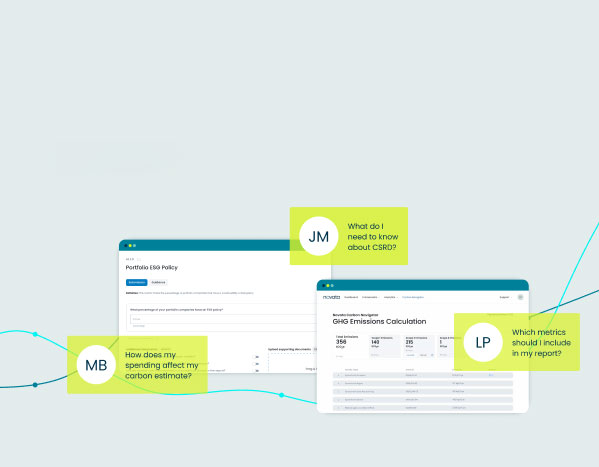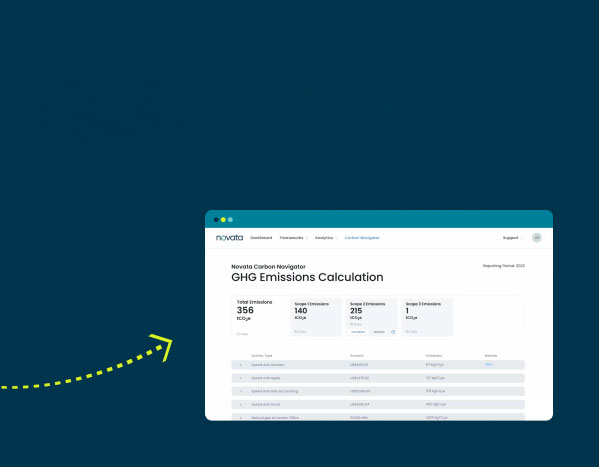The process of building a startup inherently requires an effective allocation (and reallocation) of resources. When time, human capital, and money are all constrained, how can corporate leaders beginning their ESG journey ensure that their companies are on track for a more sustainable future?
At Novata, we worked to incorporate key policies early on in our company’s journey, both to demonstrate a clear commitment to sustainability and ensure that those commitments could be met. While sustainability looks different for every industry and company, there are many unique models undertaken by leaders across the corporate ecosystem, all of which provide valuable examples and guiding principles for making commitments, taking action, and measuring progress. Below are three areas where Novata took action early on to launch our efforts to build a more sustainable future.
Consider Company Structure & Leadership (Governance)
One of the earliest decisions in the lifecycle of a company is its legal structure. For Novata, becoming a Public Benefit Corporation (PBC) was an early signal of the company’s intent to advance public good while maximizing shareholder profit.
Another early decision startups face is the composition of the leadership team. The Novata team was intentional about recruiting a diverse team across all levels of the organization, including at the board level and within the C-suite. Research shows that prioritizing diversity in leadership enables innovation and improves financial performance. In an interview last year, Novata ESG Advisory Council member, Linda Hill, offered critical recommendations for racial diversity considerations for private company boards.
Prioritize the Employee Experience (Social)
Until a company matures, competitive employee benefits and an emphasis on employee experience are often delayed or deprioritized. Instead, Novata prioritized good benefits and carved out a healthy budget for employee benefits up front. Using B Lab’s performance-based standard as a guide, Novata prioritized offering leading-class employee benefits including insurance, paid time off, family leave, 401k matching, and work flexibility considerations. Our People team continuously assesses employee needs through regular engagement surveys to ensure that employee investments are allocated where they need them most.
To prioritize the employee experience, Novata’s People team led an effort to understand and enhance each step that an employee takes with the company, from recruitment to onboarding and career development to exiting the organization. Policies and programs are designed and implemented to support all workers at every stage.
Novata aims to advance inclusive hiring practices by recruiting through organizations that serve individuals from underrepresented populations. Once hired, we train all workers on the functions of each department beyond the day-to-day requirements of their positions. Newly hired employees are paired with existing team members to help them acclimate and to ensure they feel welcomed and supported. Employees can also join any of our four established Employee Resource Groups (ERGs), which are intended to build community among individuals with shared identities or experiences, along with their allies.
At Novata, we value professional development and encourage all employees to enhance their knowledge, skills, and networks. Novata’s People team established a Professional Development Policy, which outlines benefits, programs, and recommendations for getting started. We also enhance cross-functional skill training and development through our optional Peer Learning Program, which fosters a safe space for curiosity, education, and knowledge building.
A company’s employees are its most valuable asset, so implementing inclusive policies and practices is critical to building a sustainable work environment where employees thrive and feel a sense of belonging.
Examine Environmental Footprint (Environment)
Environmental materiality varies significantly from industry to industry. As a software startup, Novata’s environmental footprint is relatively small. However, it is still important to make environmentally conscious decisions wherever possible.
When the Novata team embarked on a search for a leased office space for our New York City headquarters, we created a checklist for environmental considerations, including energy ratings, water and waste management capabilities, as well as tenant well-being considerations such as natural light. As we continue to grow and potentially seek office space for a growing workforce, we are keeping a more exhaustive list of considerations in mind. This includes building certifications that cover both tenant well-being (WELL) and environmental sustainability (LEED).
Given that Novata is a global company that prioritizes flexibility and the ability to work from home, the company developed and implemented a Virtual Workplace Policy to encourage environmentally and socially conscious decisions in our employee home offices. Examples include utilization of a clean energy provider, home energy conservation, recycling and responsible disposal of e-waste.
Additionally, to fully understand our carbon footprint, we completed a high-level assessment using our partner Climate Neutral’s Brand Emissions Estimation tool (BEE), which is also embedded on the Novata platform for other companies to use. What started as a diagnostic, high-level view of our emissions quickly turned into a team-wide, full-fledged effort to sincerely understand our company’s carbon footprint. With support from key stakeholders on the finance, operations, methodology, and customer success teams, we began the holistic process of gathering the data that defines our carbon emissions. An internal commuter survey enabled us to estimate emissions from employee travel.
Once we collected a full year of data for 2022 across our New York and European operations, we utilized Climate Neutral’s carbon refinement workbook to understand our Scope 1, 2, and 3 emissions at a more granular level. Our company’s first carbon inventory allowed us to take stock of where we stood to improve and where we could immediately make a significant change in company operations. To better understand and mitigate our carbon footprint, Novata:
-
- Established a travel policy with expectations that employees prioritize lower emissions travel (e.g., train travel instead of flights) whenever possible;
-
- Limited long-haul flights to truly high-impact, in-person events; and
-
- Restructured the way Novata employees file their expenses so that our data is more aligned with the structure of a carbon inventory.
For corporate leaders, beginning the process of calculating their companies’ carbon emissions inventory can seem intimidating. With the right tools, top-down support, and employee-wide engagement, the first steps in a company’s carbon journey can be productive and even exciting. Although our carbon footprint from commuter travel was relatively small, involving all our employees in the process generated discussion and interest.
In our first year of operation at our Manhattan-based headquarters, we worked with a locally owned and operated composting service, Common Ground Compost, LLC, to begin composting, the first step toward reducing our ecological footprint. Composting both diverts methane-producing organic material from landfills and reduces the amount of solid waste sent to transfer stations, which historic New York City planning policies have located in chronically disenfranchised communities. Novata’s compost is collected via bicycle transport to further reduce diesel pollutants that waste haulers often introduce to the communities through which they pass.
In 2022, Novata diverted more than 150 pounds of organic waste and used no more than seven gallons of gas through bicycle transportation, resulting in the offset of at least 150 miles driven. As Novata embarks on our second year of operations in our NYC office headquarters, we strive to build on our ongoing efforts to improve our waste disposal practices and habits.
Getting Started on the ESG Journey
Building a company that is sustainable in the long term requires an intentional commitment to implementing and refining policies and practices. Although it’s never too late to introduce new practices, laying cornerstones at the outset can give a startup a great foundation to build from as the company scales.
For companies getting started, B Lab’s Standards provide a comprehensive inventory of current practices and can help to identify ways to improve. It’s free to start, tailored to size and industry, and provides helpful tips along the way.
Additionally, Novata’s platform can help companies collect ESG data and share internally and with external stakeholders. When capturing early ESG metrics, companies can utilize Novata’s extensive in-platform guidance as well as our free Education and Insights resources to learn about best practices.
The process toward establishing sustainable practices is never an easy one, but more and more tools are emerging to support companies of all shapes and sizes – including startups like Novata – in their journey. With shared knowledge and transparency around these actions, companies can help each other create a more sustainable future.






